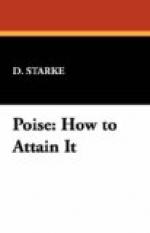To do this would be to strike a serious blow at his resolution to persevere.
The one idea of the aspirant to poise should be above all things never to risk a failure.
Such a check will rarely be a partial one. It will have a marked effect upon his proposed plan of educating his will-power by again giving rise to that confusion which is always lurking in the background of the thoughts of the timid and which is, moreover, the source of all their ills.
Another wise precaution consists in foreseeing objections and in preparing such answers as will enable one to refute them.
Eloquence is one of the most useful achievements of poise; it is also the gift that best aids one to acquire it.
It is, therefore, indispensable to train oneself to speak in a refined and correct manner.
The man who is sure of his oratorical powers will never be at a loss. He will find conviction growing while he seeks to create it.
We spoke in the preceding chapter of the mechanical exercises necessary to make speaking an easy matter.
We must not forget, however, that before one can speak one has to think.
Words will spring of themselves to our lips the moment we have a definite conception of the idea they serve to present. As a proof of this contention one has only to cite the case of those persons who, while ordinarily experiencing great difficulty in expressing themselves, become suddenly clear, persuasive, and even eloquent when it comes to discussing a subject in which they are deeply interested.
The study of the art of speaking will become, then, for people of timidity, over and above the mechanical exercises that we have prescribed in a former chapter, a profound analysis of the subject upon which they are likely to be called upon to express themselves.
One should strive to describe things in short sentences as elegantly phrased as possible.
When the idea we wish to convey seems to be exprest in a confused fashion, one should not hesitate to seek for a change of phraseology that will make it more concise and clear.
But above all—above all, we must pull ourselves up short and begin over again if any tendency to stammer, to hesitate, or to become confused, begins to manifest itself.
Just as soon as one feels more at one’s ease one can seek to put in practise all these special studies.
Nothing is quite so disconcerting as the idea of stammering or stopping short.
For this reason it is imperative that one should begin all over again the moment such an accident occurs.
This is what prevents timid people from accomplishing anything. From the moment of the first failure they become panic-stricken and can no longer go on speaking connectedly.
Those who would acquire poise must act quite otherwise.
Instead of avoiding occasions of speaking in public, they should seek for them. But first of all they must make some trials upon audiences who are in sympathy with them.




